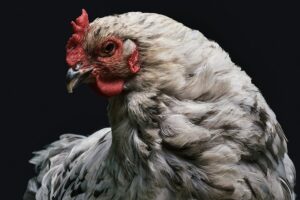Have you considered seasonal care for your chickens? Owning a flock of chickens is a rewarding experience that connects you to the cycles of nature. But with each season comes a new set of challenges in maintaining the health and happiness of your feathered friends. Seasonal changes—whether it’s the arrival of spring with its pesky parasites, the sizzling summer heat, the feather-shedding fall molt, or the icy grip of winter—require chicken keepers to be proactive and adaptable. With a mindful approach to each season, you can foster an environment that not only ensures their well-being but also optimizes egg production and enriches their quality of life.
The Spring Season Chicken Care
In spring, the warmer weather brings a surge of growth and activity, not all of it welcome. The damp conditions and warmer temperatures can create an ideal environment for parasites.
Parasite Prevention: This is the season to be vigilant against mites, lice, and internal worms. Regular coop cleaning, the use of poultry-safe disinfectants, and herbs with natural anti-parasitic properties can all contribute to a healthier flock.
Diet Adjustments: With longer daylight hours, hens will be laying more eggs, which means an increased need for calcium. Introduce fresh greens and crushed oyster shells to their diet to support the egg-laying process.
Habitat Preparation: Deep clean your coop to remove any accumulated muck and damp bedding that can harbor disease. Add fresh bedding and ensure good ventilation to provide a comfortable space for your birds.
The Summer Season Chicken Care
Summer can be a season of abundance but also a time of stress for your flock. High temperatures can lead to heat stress and an increase in predator activity.
Heat Stress Management: Ensure your coop has good ventilation and provide ample shade in the run. Frozen treats like watermelon can be refreshing, and adding electrolytes to their water can help combat dehydration.
Predator Alert: The warm weather means that predators, such as foxes and raccoons, will be more active. Check fences and coops regularly for signs of intrusion and reinforce as needed.
Nutritional Needs: Chickens may eat less due to the heat, so it’s important to provide a balanced diet. Monitor feed consumption and consider offering foods with a higher water content to keep them well-nourished.
The Fall Season Chicken Care
The fall harvest brings with it the natural process of molt as well as preparations for colder weather.
Molt Support: During the molt, chickens divert their energy towards regrowing feathers, which means they need a protein-rich diet. Mealworms and higher-protein feeds can be beneficial during this time.
Pre-Winter Check: Inspect your coop and run for cracks, gaps, and leaks. Make necessary repairs and consider insulating if you live in a cold climate. This is also the time to stock up on bedding and feed for the winter months.
Flock Health Check: This is the best time to administer any vaccinations or health treatments before winter sets in. Regular health check-ups can help catch and treat any issues early.
The Winter Season Chicken Care
The cold can be brutal on chickens, so it’s crucial to protect them from frostbite and ensure they’re kept warm and dry.
Frostbite Prevention: Apply petroleum jelly to combs and wattles to keep them from freezing. Avoid using heat lamps due to fire hazards; instead, focus on insulation and providing enough collective body warmth.
Ventilation Without Drafts: Proper ventilation is important, even in winter, to prevent respiratory problems. Install vents with baffles or covers that can be adjusted to allow air in without creating drafts.
Proper Feeding: Chickens need more calories in the winter to maintain body heat. Offer warm, calorie-dense treats like oatmeal, and provide additional feed to support their energy needs.
Year-Round Tips
While specific to each season, dedicated attention to certain aspects of chicken care should remain constant year-round.
Routine Health Checks: Regularly inspect your chickens for signs of illness, injury, or unusual behavior. Early detection of health issues is key to effective treatment.
Clean Water and Feed: Hydration is vital, and chickens may refuse to drink water that is dirty or frozen. Ensure access to fresh water, and clean feeders regularly to prevent disease.
Engagement and Exercise: Chickens need mental stimulation and the opportunity to engage in natural behaviors like scratching. Provide perches, dust baths, and a spacious run to keep them active and happy.
By following these seasonal care tips, you’re not just ensuring the survival of your flock, you’re setting the stage for thriving, resilient, and content chickens. Remember that each season is just a passage in the ongoing life of your chickens as they, like us, adapt and find joy in the natural world around them.
Conclusion
The annual cycle of seasons offers unique opportunities and potential challenges for chicken keepers. Adapting your care routine to the changing needs of your flock is a labor of love that promises healthy, robust chickens and a bountiful yield of fresh, flavorful eggs. May these tips serve as a guide throughout the year, supporting a harmonious relationship between you and your clucking companions. Happy homesteading!
Check out my other chicken care articles:
Chicken Foraging and Free Ranging
Best Chicken Breeds for Egg Laying

